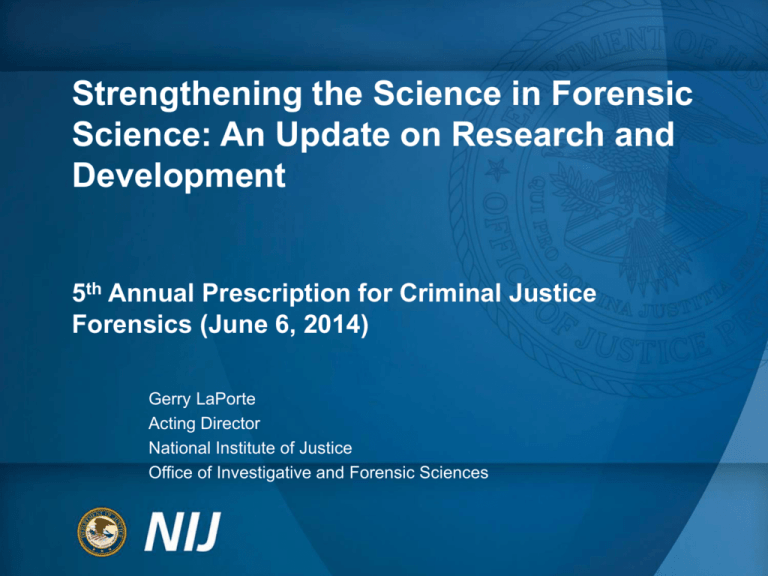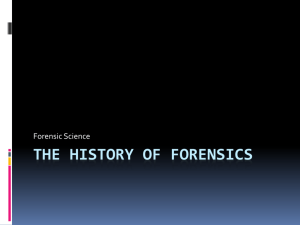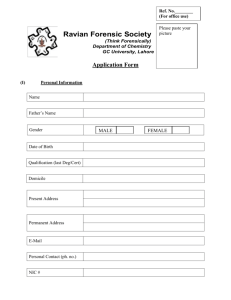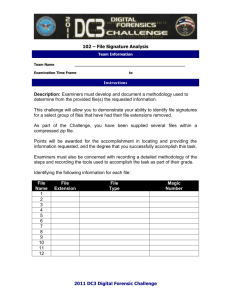Forensics_Research_LaPorte
advertisement

Strengthening the Science in Forensic Science: An Update on Research and Development 5th Annual Prescription for Criminal Justice Forensics (June 6, 2014) Gerry LaPorte Acting Director National Institute of Justice Office of Investigative and Forensic Sciences What has been happening since 2009? 13 Recommendations Recommendation #3 • Research is needed to address issues of accuracy, reliability, and validity in the forensic science disciplines. Recommendation #5 • Encourage research programs on human observer bias and sources of human error in forensic examinations. Focus of Discussion: Impression and Pattern Evidence Disciplines • • • • • Friction Ridge Analysis (Latent Prints) Firearm & Tool Mark Examinations (FTE) Shoeprint and Tire Tread Evidence Questioned Documents/Handwriting Examinations Bloodstain Pattern Analysis (BPA) This discussion does not focus on Bite Mark Evidence, Detector Dog Teams, Forensic Audio and Video Analysis, or Microscopic Hair Analysis What is your perception of forensic science R&D in the areas of impression and pattern evidence? What ‘grade’ would you give the efforts? • Grade: F – There has been insufficient progress since 2009 to respond to the research and development recommendations in the NAS Report. • Grade: C – There has been some progress since 2009. There are still many unanswered questions with respect to accuracy, reliability, and error rates. • Grade: B – There has been significant progress since 2009. There have been multiple studies to address accuracy, reliability, and error rates. • Grade: A - There has been overwhelming progress since 2009. There is no longer a need for significant investment in additional strategies to address accuracy, reliability, and error rates. Lack of Commitment to R&D Will Impede Knowledge and Innovation If the law has made you a witness, remain a man of science. You have no victim to avenge, no guilty or innocent person to convict or save — you must bear testimony within the limits of science.1 1. Dr. P.C.H. Brouardel, 19th Century French Medico-legalism. DOJ Issues Scientific and Research Integrity Policy http://www.justice.gov/open/doj-scientific-integrity-policy.pdf DOJ Asserts NIJ Independence “Across-the-board culture of scientific, technological and research validity, reliability, accuracy, objectivity and integrity” “Director of the National Institute of Justice shall have final authority over all grants” “NIJ retains control over the timing and content of research reports” NIJ REACTS IMMEDIATELY TO THE 2009 NAS REPORT WITH RESPECT TO THE CALL FOR MORE SCIENTIFIC RESEARCH NIJ Issues ‘First of its Kind’ Solicitation Immediately Following the NAS Report NIJ Establishes the Office of Investigative and Forensic Sciences (OIFS) in 2010 • The mission of OIFS is to improve the quality and practice of forensic science through innovative solutions that support research and development, testing and evaluation, technology, information exchange and the development of training resources for the criminal justice community. • Scientific staff include physical scientists with varying backgrounds and experience NIJ Leadership: Establishing NIJ as the Nation's Leader in Scientific Research on Crime and Justice • “NIJ Director John H. Laub, Ph.D., and his long-time research partner, Robert J. Sampson, Ph.D., of Harvard University, are joint recipients of the 2011 Stockholm Prize in Criminology” • “Upon the departure of Director John H. Laub, Deputy Director Greg Ridgeway, who received his doctorate in statistics, became Acting Director” NIJ Has a Substantial Investment in Forensic Science R&D • Since 2009, NIJ has – Provided more than $100 million in R&D awards – Launching more than 250 R&D projects – Producing more than 600 scientific publications, presentations, and final technical reports FY 2011-2013 NIJ R&D Solicitations Applied Research & Development Basic Research NIJ Collaborates with NIST by Providing More than $19 Million since 2009 • 2009 to 2014 - NIST’s Applied Genetics Human Identity Team • 2009 to 2014 - NIST’s Forensic Toolmark Analysis Project Team • 2011 - NIST conducted a review and evaluation of the accuracy of commercially available photo scales • 2012 - Expert Working Group on Human Factors in Latent Print Analysis • 2013 - Latent Print AFIS Interoperability Working Group • 2013 - Working Group for Biological Evidence Preservation • 2013 - Working Group on Forensic Science Laboratories • Present - Working Group on Presenting Forensic Science Evidence Using Quantitative and Qualitative Terms Overall Distribution of Funds Between Applied and Basic/Fundamental Overall NIJ Distribution of Funding: Applied vs. Basic/Fundamental Applied Basic/Fundamental 33% 67% Forensic Science R&D Funding for FY2009-2013 Discipline Funding Awarded % Awards Overall NIJ Distribution of Funding: Forensic Discipline Categories Anthropology $4,541,571 4.49% 19 Controlled Substances $2,659,868 2.63% 9 Crime Scene Investigation $4,229,401 4.18% 14 Digital Forensics[1] $2,821,191 2.79% 5 $483,323 0.48% 1 $2,848,270 2.82% 7 Forensic DNA $35,960,168 35.56% 74 Friction Ridge $8,543,027 8.45% 20 General Forensics[2] $2,170,237 2.15% 6 Impression Evidence $10,936,182 10.81% 28 Forensic Pathology $6,912,372 6.83% 12 Questioned Documents $1,989,618 1.97% 5 Forensic Toxicology $5,345,849 5.29% 14 $11,697,765 11.57% 37 100.00% 251 Forensic Entomology Fire and Arson Investigation Trace Evidence Anthropology Controlled Substances Crime Scene Investigation Digital Forensics Forensic Entomology Fire and Arson Investigation Forensic DNA Friction Ridge General Forensics Impression Evidence Forensic Pathology Questioned Documents $101,138,842 Forensic Toxicology Trace Evidence Office of Science and Technology Policy (OSTP) Releases Report in February 2014 http://www.whitehouse.gov/sites/default/files/microsites/ostp/forensicscience_progressreport_feb-2014.pdf Snapshot of Other Efforts • From 2011 through 2014, the Annual Meeting of the American Academy of Forensic Sciences (AAFS) has included over 4,000 oral/poster presentations and 137 workshops. • From 2009-2013, the Journal of Forensic Identification (JFI) has received 341 manuscripts and published 231 peer reviewed articles. • From 2009-2013, the Association of Firearm and Tool Mark Examiners (AFTE) Journal has published 255 articles. The AFTE Journal was accepted to SCOPUS in 2013. Other Journals Focused on Forensic Science R&D • • • • • Journal of Forensic Sciences Forensic Science International Journal of the Canadian Society of Forensic Science Journal of Forensic and Legal Medicine Journal of the American Society of Questioned Document Examiners • Many open access online Journals WHAT WAS HAPPENING PRE-2009? Pre-2009? • NIJ R&D responded to the needs of the forensic science community. i.e., NIJ can only support proposals submitted for consideration! • Heavy investment in DNA R&D • Investments continued in innovation and new technologies • Limited successful challenges to admissibility of impression and pattern evidence – over a decade passed since Daubert v. Merrell Dow Pharmaceuticals (1993) Pre-2009? • No evidence that impression and pattern evidence disciplines were not accurate and reliable: Karl Popper philosophy – science must be falsifiable. All swans are white ... until you see a black swan • Research was being conducted throughout laboratories for years, but submitting manuscripts for peer review/publication was considered burdensome – there is anecdotal evidence of a culture change. NIJ Research is Based on the Needs of the Forensic Science Community: Use of Technology Working Groups (TWGs) • DNA Forensics DNA & Forensic Biology • General Forensics Crime Scene & Medicolegal Death Investigation Controlled Substances & Toxicology Impression and Pattern Evidence Instrumental Analysis/Chemistry NIJ Research is Based on the Needs of the Forensic Science Community http://nij.gov/topics/forensics/Documents/fy14-forensic-twg-table.pdf Investment in DNA Research and Development Fiscal Year 1995 1996 1997 1998 1999 2000 2001 2002 2003 2004 Total Number of Average Award Investment* Projects* Size $378,294.00 4 $94,573.50 $715,857.00 5 $143,171.40 $1,495,436.00 6 $249,239.33 $1,312,240.00 5 $262,448.00 $3,112,895.00 10 $311,289.50 $3,953,664.00 7 $564,809.14 $2,979,398.00 5 $595,879.60 $3,948,253.00 10 $394,825.30 $4,256,720.00 11 $386,974.55 $5,258,507.00 13 $404,500.54 2005 $10,246,365.00 17 $602,727.35 2006 2007 2008 2009 2010 2011 2012 9 10 17 18 18 14 13 $240,456.56 $404,856.30 $492,807.18 $451,868.77 $520,577.83 $399,487.79 $380,550.23 $2,164,109.00 $4,048,563.00 $8,377,722.00 $5,894,294.00 $9,370,401.00 $5,592,829.00 $4,947,153.00 1985 Discovery of VNTR probes 1991 st 1 paper on STR R&D Investment in Forensic Biology/DNA $12,000,000 $10,000,000 $8,000,000 $6,000,000 $4,000,000 $2,000,000 $0 1998 FBI Launches CODIS 2000 Backlog Elimination Act 2005 DNA Fingerprint Act 1st paper on PCR 1997 NIJ/NIST/ASCLD: Forensic Science Summit 1999 NIJ Report -- FS: Review of Status and Needs 2004 DNA Initiative Started 2013 Number of Wrongful Convictions Attributed to Unvalidated/Improper Forensic Science 20 18 16 14 12 10 8 6 4 2 0 1970 1975 1980 1985 1990 1995 2000 2005 2010 Lack of evidence that invalid impression and pattern evidence science is a root cause to wrongful convictions • Not a single exoneration has been attributed to the accuracy and reliability of a method* with respect to: • Friction Ridge Analysis • Firearm & Tool Mark Examinations • Shoeprint and Tire Tread Evidence • Questioned Documents/Handwriting Examinations • Bloodstain Pattern Analysis Note: Negligent analysis, fabrications/alterations of reports, withholding data, exaggerated testimony, and individual examiner errors are not the basis of unvalidated science. Laboratory Operations: Perception that there are problems with the foundational science as it relates to accuracy and reliability (Not True) EXAMPLES OF RESEARCH NAS #3: Research to address issues of accuracy, reliability, and validity in the forensic science disciplines Improving the Understanding and the Reliability of "Sufficiency" in Friction Ridge Examination • Pennsylvania State University • Award: 2010-DN-BX-K267 – This study aimed to understand how latent print examiners determine the value of a latent print by testing the ability of practitioners to annotate the quality, number, and spatial relationships of features in experimental latent print trials. – Main empirical findings show that examiner decision-making is related to the number and spatial relationships of fingerprint minutiae, and factors like experience and workload has no clear relationship with the reliability of examiners’ conclusions. NOBLIS-FBI Study: False Positive Rate of 0.1% http://www.pnas.org/content/early/2011/04/18/1018707108.full.pdf TWG Need: Establishment of best practices in trace evidence analysis to improve efficiencies Significance of Elemental Analysis from Trace Evidence • Florida International University • Award: 2009-DN-BX-K252 Glass is one of the most common types of trace evidence found in case scenarios, such as hit-and-run accidents, burglaries, kidnappings, homicides and shootings. The goal of this research was to develop analytical protocols and to assess the utility of glass source comparisons by way of several interlaboratory studies conducted by 31 forensic examiners representing 23 different laboratories in the United States, Mexico, Canada, and Germany. Link: https://ncjrs.gov/pdffiles1/nij/grants/242325.pdf NAS #3: Research to address issues of accuracy, reliability, and validity in the forensic science disciplines Improve the Scientific Foundation of Forensic Firearm and Toolmark Identification • Miami-Dade Police Department Crime Laboratory • Award: 2009-DN-BX-K230 – This study analyzed the repeatability and uniqueness of striations and impressions on cartridge cases fired in 10 consecutively manufactured slides by evaluating the ability of firearms and tool mark examiners to correctly identify test fired cartridge casings fired from the same slides at different intervals (i.e., the identification of same gun evidence). Link: https://www.ncjrs.gov/pdffiles1/nij/grants/237960.pdf Just Released Using Quantitative Image Comparisons for Estimating Error Rates • The model developed in the paper was able to account for 64% of the variation in print comparison accuracy on a novel set of fingerprint images. “While some of the predictors we found likely comport with what fingerprint examiners would have intuited, being able to demonstrate their role scientifically, and measuring, rather than just assuming, their importance is a significant step forward,” Mnookin stated. Summary of Forensic Science Research and Development Awards http://www.nij.gov/topics/forensics/exhibits/pages/forensic-awards.aspx Examples of Latent Print R&D Examples of Impression and Pattern Gerry LaPorte, M.S.F.S. Acting Director National Institute of Justice Office of Investigative & Forensic Sciences Gerald.Laporte@usdoj.gov Important Links: Forensic Science R&D Awards: http://nij.gov/topics/forensics/pages/forensic-awards.aspx Fiscal Year 2012 Funding for DNA Analysis, Crime Laboratory Capacity Enhancement and Other Forensic Activities: http://ncjrs.gov/pdffiles1/nij/244196.pdf






